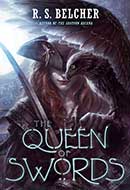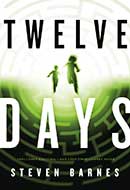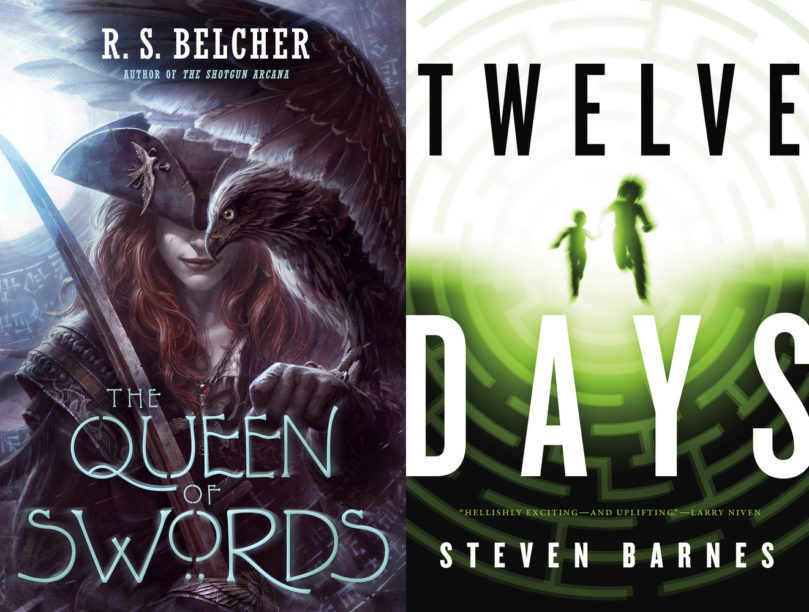





 For a thousand years, the lands ruled by the Cymrian Alliance have been at peace. When the brutal death of a dear friend catapults the kingdom to the brink of civil war, Rhapsody finds herself in an impossible situation: forced to choose between her beloved husband, Ashe, and her two oldest friends, Grunthor and Achmed. Choosing her husband will mean the death of thousands of innocents. Siding against him will cost Rhapsody the other half of her soul, both in this life and the next.
For a thousand years, the lands ruled by the Cymrian Alliance have been at peace. When the brutal death of a dear friend catapults the kingdom to the brink of civil war, Rhapsody finds herself in an impossible situation: forced to choose between her beloved husband, Ashe, and her two oldest friends, Grunthor and Achmed. Choosing her husband will mean the death of thousands of innocents. Siding against him will cost Rhapsody the other half of her soul, both in this life and the next.
In The Weaver’s Lament, the lines between the past and future are irrevocably blurred, and the strength of true love is tested in unthinkable ways. Bestselling author Elizabeth Haydon has delivered a spectacular conclusion to the Symphony of Ages.
The Weaver’s Lament, Elizabeth Haydon’s heartbreaking tale of love and valor, will become available June 21st. Please enjoy this excerpt.
Chapter 1
EASTERN BORDER OF THE FOREST OF TYRIAN
At the crossing of the trans-Orlandan thoroughfare and the eastern forest road, Achmed the Snake thought he had caught the faintest trace of woodsmoke in the air.
He reined his horse to a stop and inclined his head to the west, seeking to confirm what his nose had hinted at, but sensed nothing further.
The Bolg king wearily loosed the reins and rubbed his face vigorously, then ran his thin-gloved fingers through his hair, damp with sweat. He took another breath, only to be greeted with the warmth and heavy perfume of late summer, wafting over him on a brittle wind. Nothing more.
Achmed glanced around for a place to water his mount and located a nearby quick-running stream winding its way out of the forest in the distance. He nudged the horse toward it and dismounted, allowing the animal some rest with its refreshment and himself the whimsy of memory.
It had been just short of a thousand years since he had been in this place, owing largely to its status as a backdoor route into the eastern edge of the forest of Tyrian. There had been no reason to brave the hidden defenders that were invisibly guarding this part of the Lirin kingdom when he could just as easily enter Tyrian via any of its public entrances, as he had done whenever the spirit had moved him to do so in the past. There had been relatively few times that the spirit had so moved him; Achmed disliked forests in general and the Great Forest of the western part of the continent in particular. He preferred to do his visiting with the other two people in the world who, with him, made up what had been known long ago as the Three in the quiet solidity of his mountainous kingdom of Ylorc, where the ancient stone hallways and cavernous rooms were immune to prying eyes and free of the tattletale wind.
But since one of those two people was not cooperating, and the other would be arriving from the south shortly, he had decided to undertake a journey to check on his Wings, the network of carefully bred and selected horseflesh that he kept in secret stables across the continent for his personal use, which allowed him to traverse substantial distances in minimal time.
It was as good an excuse to leave the mountains without a guard regiment as any.
Achmed pushed his cloak back over his shoulders and crossed his arms, then turned around, taking in the sight of the forest to the west, the Krevensfield Plain behind him, and, in the distance, the jagged mountains to the south known as the Teeth, the cousins to the mountains of his own kingdom.
His eyes narrowed as the memory he sought returned.
The last time he had been here had been in the throes of the War of the Known World, the last intercontinental conflict the Cymrian Alliance, to which his kingdom was a signatory member, had suffered. A millennium had passed since those days, a largely peaceful time in which great advances in architecture, mechanics, medicine, and machinery had been made in Roland, the central nation in the breadbasket of the continent; political strife and diplomacy had been undertaken in the former empire of Sorbold, where now seventeen city-states, most of them members of the Alliance as well, had sorted themselves out of the destruction of that broken empire into independence; and his own kingdom had continued to rebuild and grow its military might. A substantial amount of progress had been made on all of those fronts—the center, southern, and eastern lands of the Middle Continent.
But here at the outskirts of Tyrian, the western coastal region covered mostly in thick, primeval forest, the view could easily have passed for that time long ago when last he had stood in this place.
It also could have reasonably been mistaken for a moment even longer ago when he had first stood there, upon coming to this continent.
Achmed knew that the primitive appearance of the forest was in many ways an illusion. Tyrian had undergone great progress in the last thousand years as well; healing centers and repositories of lore had been erected within the arms of the great wood, along with improved defenses and cooperatives for agriculture from which the Lirin fed much of the northern lands that could not grow their own food. But all of that millennial progress had been undertaken with an eye toward preserving the innocence of the forest, the natural antiquity of the land, and so it was not surprising that he was seeing now what his eyes had seen a thousand years before.
In the near distance to the south, he caught a trace of a familiar heartbeat approaching.
The Bolg king smiled slightly.
When counted in real time, his familiarity with that heartbeat had a history of almost three thousand years. He had walked, hidden, fought, and slept beside it on two sides of Time, and of the world as well—as well as in the world’s belly.
It thudded mightily on the wind, but less so than it had in the Past.
He walked back to the horse and stood beside it, waiting.
A few moments later, a mount of almost twice his horse’s size appeared over the edge of a swale in the forest road coming from the south. Atop it was his oldest friend in the world, the massive Sergeant-Major whose actual title was Supreme Commander of the forces of the mountainous realm of Ylorc, far to the other side of the continent, at its eastern edge, but who chose to be called Sergeant by his troops.
Grunthor by his friends.
From a distance, the giant grinned in greeting, but maintained his steady canter.
Jutting from the bandolier he wore, the hilts and handles of an impressive collection of bladed weapons still stood at the ready, as they had on both sides of Time, making him appear to have a sinister sun rising behind him, or as if he were the center of a monstrous daisy. His seat on the specially bred horse was as natural as it had ever been, his seven-and-a-half-foot frame sitting erect, without a nod to age or the damage he had sustained over his lifetime, more through sheer force of will than anything else.
Achmed, arms still crossed, assessed his friend’s health and stamina as the giant rode closer, displeased with what he witnessed. While he had noticed no signs of aging or decline in his own status for the last millennium or so, nor had he seen a wrinkle or graying of hair on Rhapsody the last time he had been in her presence, the third member of the Three was not faring as well. His shaggy hair and beard, once an impressive shade of burnt orange and the thick consistency of a horse’s mane, were sparser and gray; his skin, the color of old bruises, seemed more sallow than the last time Achmed had beheld him, which had not been that long ago.
But the grin was still bright, the eyes twinkling in the aging face.
Given the two races from which he was descended, Achmed thought, it was impressive that Grunthor was still moving autonomously at all. His father had been Firbolg, the race of demi-human hybrids that careful medical attention and a thousand years of peace had managed to bring to an average life span of forty years. Grunthor’s mother was Bengard, one of the long-dead race of enormous desert dwellers who were impossible to gauge years for, owing to their love of bloodsport and arena fighting. The Bengard had put a premium on living bravely and dying young gloriously.
The fact that both of the only friends he’d ever had were still living was a miracle.
Achmed exhaled, lost in memory.
The new world had not been new for a long time, he mused; the places that he and the other two of the Three had discovered upon coming through the Root of the great world tree Sagia from their island homeland of Serendair were no longer fresh or alien, but dull in their familiarity. He and Grunthor had together completely restored, reoutfitted, and reenvisioned the massive, mountainous city-state of Ylorc, carved into the eastern Teeth almost three millennia before by Gwylliam the Visionary and left in ruins by the Cymrian War a thousand years later. The secrets in those endless, broken tunnels had all been found, the mysteries had all been solved; now the Bolg army, half a million strong, was the best-outfitted and best-trained fighting force on the continent, perhaps in the Known World, but it had seen nothing but military exercises and war games, with no live battle, for many centuries.
All that peace was aging Grunthor, a child of the arena and the battlefield, Achmed knew, even more than some of the cost of war he was paying from ten centuries before.
“Well met,” he said to the Sergeant as he drew his enormous horse to a halt.
The giant pulled off his helm, ran a hand through his sweaty hair, and nodded.
“Well, ‘allo, sir,” he said cheerfully. “Glad ta see you, too. Where’s the Duchess?”
“Late. Are you surprised?”
“Not a bit. All well in Ylorc?”
Achmed watched as Grunthor dismounted slowly, shaking the ground as he alighted. “Indeed. The vineyards are beginning the first round of harvest. Looks to be a fine one this year—if the weather holds as the Invoker predicts, we should even get a late third, an ice wine that they’ll love in Marincaer, the simpletons. How were your travels?”
The Sergeant-Major’s smile dissolved into a solemn expression. “Buried Trom.”
The Bolg king exhaled. “I’m sorry.” Grunthor’s success as the sire of a multitude of Bolgish children with superior genes for war, originally propagated as a side effect of one of his favorite appetites, had so far produced thirty-seven generations, the first round of which had been gone for nine centuries—except for Trom.
While all of the mothers of his other children in the first generation, Bolg women of various levels of stature, were long deceased, Trom’s mother had been Lelik, a Finder, spawned of the rape of a First Generation Cymrian, probably a woman, and one of the first ranks of Firbolg who overran Canrif, as Ylorc was known at the time, in the days following Gwylliam’s death and the evacuation of the mountains by Anborn, Gwylliam’s son and general, a millennium and a half before the Three had come to the continent.
Her Cymrian ancestry meant that she was exceptionally long-lived.
Lelik had become one of Achmed’s second round of Archons, the select caste of Bolg who had been determined to be of leadership ability, and the mother of one of Grunthor’s first children. The extraordinary longevity Trom inherited from his Cymrian/Firbolg mother, in concert with the apparent immortality of his father, had allowed Grunthor the pleasure of keeping a child over the centuries, when all of his other progeny had come and gone in what seemed the wink of an eye. It had also allowed for at least some duration of an individual woman’s company, the only example of it Achmed knew of in Grunthor’s life on either side of Time.
Trom’s demise was the end of an era, even if that era only had one successful example of procreation and female companionship.
Grunthor made a gesture brushing off the sympathy.
“Well, thank ya, sir, but it was time. Long past, rather—’e’d lost the use of ‘is legs and other functions long ago; no soldier wants to live like that.”
“I suppose not. How many did you get out of that line, do you suppose?”
“Dunno,” said the giant cheerfully. “Twen’y or more generations. Think Oi still see new litters of Trom’s ‘Greats’ every now an’ then. Lookin’ forward to gettin’ back to Ylorc an’ knockin’ out a few more brand-new ones o’ my own.”
Achmed smirked. “No luck in the pleasure palaces of the former Sorbold, eh?”
Grunthor shook his head. “Lost my taste fer women other’an Bolg a long time ago, sir. Well, at least that kind o’ taste. Always willin’ to snack on a few Lirin, but seems that’s frowned upon nowadays.”
“Truly we have lived too long. Well, best of luck with the new crop. If you keep at it, you may even catch up with Rhapsody. How many brats has she pushed out so far?”
“Still only six,” came a voice in their ears, as if from the air around them. “And you would both know if anything had occurred otherwise, given that one of you is godfather to each of them, and the other is guardian to them all.”
Both men looked around them in surprise.
“Where are you?” Achmed demanded of the air.
“On my way. You’re standing in the vibrational buffer zone surrounding Tyrian, Achmed, you idiot. You didn’t think I, and every communications specialist in the Lirin army, could hear you? And yes, snacking on Lirin is still considered frowned upon, Grunthor. Now back up about three hundred paces and, for the love of God, the One, the All, stop talking until I get there.”
The two men looked at each other, then dissolved into quiet snickering.
Achmed sought her heartbeat on the wind and caught it a moment later, a strong, steady rhythm, though light in tone compared to the thundering of Grunthor’s. They were two of the only heartbeats he could still feel in his skin, a gift he had inherited long ago from a Dhracian named Father Halphasion, who had been his mentor in youth, and had named him the Brother.
He thought back, for the first time in as long as he could remember, to the gentle monk who had rescued and cared for him after his escape from the Bolg of Serendair who had raised and abused him from birth. The name had been bestowed upon him, the priest had said, because he was “brother to all, akin to none.” The resulting connection to the populace of the Island of Serendair, the drumming, tittering, pounding, and thrum of every heartbeat on that island, had all but driven him mad.
Now there was most often silence in his skin unless he sought those heartbeats.
But one that he frequently monitored was approaching from the west.
Grunthor was the first to catch sight of her, and broke into a wide grin upon doing so.
“Well, there she is. The ‘orse looks new.”
Achmed nodded as the forest roan, and the woman atop it, came into his view.
He breathed a little easier upon beholding her.
Occasionally over the centuries when seeing her after a long absence he found her appearance startling. While neither Time nor battle had made a mark on her physically, there was often something in her eyes and expression that was different, or something off-putting to him about the clothing in which she was attired at events where they met up.
While he and Grunthor, in his estimation, had changed very little from the days when the Three had first met, Rhapsody had evolved a great deal. Her inability to contain both excitement and wrath from her younger days had resolved into a queenly calm, a steadiness he recognized as necessary to her role as Lady Cymrian and Lirin sovereign, but he considered boring nonetheless. Her emerald eyes used to sparkle at anything she found interesting, and it had been a secret challenge of his in the old days to make that happen. Now they tended to gleam when she was pleased or angered, which brought the same light into those eyes, but it was hardly as interesting.
And the court clothing in which she was often garbed at events of state was nothing like the two or so dozen dresses he had reluctantly purchased for her when they first had come to the mountains of Ylorc together. In those days, Rhapsody’s excitement upon receiving what was by and large high-quality peasant garb had made his skin-web, the sensitive network of veins and nerve endings that scored the surface of his body, tingle and hum pleasantly for days afterward. Now she was routinely gowned in heavy fabric of countless cost, sewn and embroidered by the patient hands of expert seamstresses from around the world. It was always a spectacular blending of beauty and artistry to behold, but it made her seem an entirely different person.
But the woman atop the roan was the one he remembered.
Rhapsody was smiling broadly, her face alight, her golden hair pulled back in a simple fall and tied in a black ribbon, as he remembered it from the old days. She was garbed in a white muslin shirt like any other Lirin citizen and wore moleskin pants tucked into sensible boots, much like the ones she had clothed herself in during their time together as the Three.
Achmed could hardly contain his relief.
“You came alone?” he demanded as she reined the horse to a stop and vaulted down from it, running to greet them.
She wrapped her arms around him first, filling his nostrils with her scent and soothing his prickly skin with the natural musical vibration that emanated from her. Then, upon comprehending his comment, she pulled back and looked at him in surprise.
“You have a problem with that?” she asked incredulously. “I somehow thought you preferred it when Ashe doesn’t come with me.”
“That goes without saying,” Achmed said as she moved on to Grunthor, who picked her up and spun her around like a child. “I was referring to Meridion.”
“Oh,” said Rhapsody when the giant returned her to the ground after a long, warm hug. “I hadn’t realized you would want to see him, I’m sorry. He can be here if you’d like. He and you, Achmed, are the only people—besides Rath and the other Dhracians, of course—that I have ever known who can travel in a way that essentially overcomes time and distance—you by riding the currents of the wind, as the Dhracians taught you, and Meridion by collapsing the passage of Time. I would be happy to summon Meridion if you’d like. He’s nearby—he and I have been attending a Namers’ convocation at the Repository of Lore in Tyrian City.”
“Yeah, why not?” Grunthor said. “Always a nice thing ta see my first godson.”
Rhapsody nodded and turned back to the forest. She sang a sweet incantation, repeating it several times, then loosed it to waft away on the hot wind of summer’s end.
“Come with me,” she said, waving them both back in the direction of her roan. “I’ve arranged a meal, some privacy and security at one of the border watchers’ longhouses just inside the forest edge. I know that you aren’t fond of being away from the deep Earth, but the longhouse roof is enclosed, so it’s a little like the caverns of Ylorc, and I think you should enjoy the food and libations. And we can be together, just like old times, at least for a while. I’m so glad you both were able to come for the family gathering.”
“Family gathering?” Grunthor queried.
“I am not coming to that,” Achmed said flatly. “I came to see you, and perhaps Meridion, or any other of your progeny you had with you, but I believe I was clear in my response to your invitation to the gathering at Highmeadow.”
Rhapsody hoisted herself back up atop her roan.
“Oh, that’s what I was supposed to infer when you returned the invitation I sent you via avian messenger, for security reasons, by shredding the paper and blowing your nose on it? I completely misunderstood. I apologize.”
“You should consider yourself lucky with my choice of bodily excretions,” Achmed said, mounting as well. “I had to scale back my original intentions for the health of the innocent bird.”
“Why would you not come?” Rhapsody asked, appearing sincerely stricken. “You are the only members of my family that won’t be in attendance.”
“My point exactly.”
Rhapsody sighed as Grunthor finally summited his mount, taking his time and care.
“You could come, you know, Grunthor. I hope you will. Your godchildren, and all the Grands and Greats, are really looking forward to seeing you.”
The Bolg Sergeant shook his head regretfully.
“Naw, thanks, Yer Ladyship, but I’m not really feelin’ up fer it,” he said wistfully. “Just came from putting Trom in the ground. Not in the mood for a celebration, sorry.”
“I’m so sorry,” Rhapsody said, reaching across horses and patting his arm consolingly. “I had no idea.”
Grunthor covered her small hand with his enormous, pawlike one. “Yeah, it was quiet and fast,” he said, taking the reins in his own. “The way ‘e woulda chosen if ‘e’d been given the choice. Do ya think you might sing ‘is dirge? Trom always did love to ‘ear you sing.”
“Of course; I’ll do it tonight before Meridion and I head back toward Highmeadow. Was he ill?”
“Not really.” Grunthor nodded to Achmed as the Bolg king signaled his readiness to ride. “Trom never really got back ta whole from when those Alliance soldiers beat ‘im into oblivion a couple ‘undred years ago.”
Rhapsody’s eyes flashed with anger. She set her teeth and nodded, but Achmed could see the rage swim through the muscles of her shoulders.
He took silent pleasure in the fact that she was still furious over the unprovoked assault that Trom and his regiment had endured at the hands of the soldiers of her husband’s army.
And hers.
He had stood beside her on the gallows at the hangings of the men responsible, with very much the same look on her face, the same anger in her eyes.
“Grunthor is looking forward to returning to Ylorc and getting started on fathering a new rash of baby Bolg,” he said, attempting to lighten the mood.
Rhapsody’s eyes cleared of anger, and she smiled in the direction of the Sergeant.
“That’s wonderful,” she said sincerely. “I know how much you love your children, Grunthor, especially in the infant phase.”
“‘At’s right,” said Grunthor smugly. “Bite-sized, chewy, with a nice crunch. It’s a good breedin’ plan—either they’s well-be’aved, or they’s delicious. Ya win either way.”
“Oh, stop that,” Rhapsody said to the back ends of both of her friends’ horses, noting how much they had in common with their riders as she rode astride, catching up and leading them into Tyrian by the forest road.
Copyright © 2016 by Elizabeth Haydon
Buy The Weaver’s Lament from:






 As the candidacies of Donald Trump and Bernie Sanders have proven, Americans are mad as hell about the problems facing our country. George Noory hears these problems every night, all night, and this is how he would deal with them. This is Mad as Hell.
As the candidacies of Donald Trump and Bernie Sanders have proven, Americans are mad as hell about the problems facing our country. George Noory hears these problems every night, all night, and this is how he would deal with them. This is Mad as Hell. 1870. Maude Stapleton, late of Golgotha, Nevada, is a respectable widow raising a daughter on her own. Few know that Maude belongs to an ancient order of assassins, the Daughters of Lilith, and is as well the great-great-great-great-granddaughter of Anne Bonney, the legendary female pirate.
1870. Maude Stapleton, late of Golgotha, Nevada, is a respectable widow raising a daughter on her own. Few know that Maude belongs to an ancient order of assassins, the Daughters of Lilith, and is as well the great-great-great-great-granddaughter of Anne Bonney, the legendary female pirate. A paranormal thriller from master storyteller Steven Barnes: A broken family struggles to hold itself together against a plot to unleash global genocide.
A paranormal thriller from master storyteller Steven Barnes: A broken family struggles to hold itself together against a plot to unleash global genocide.















